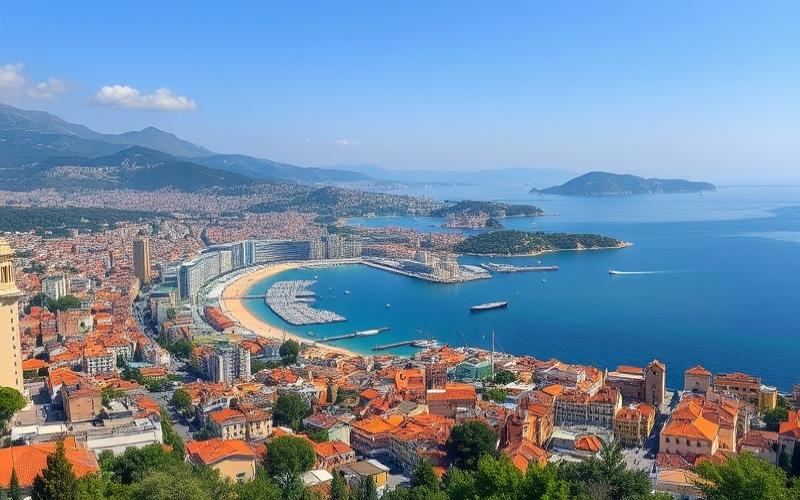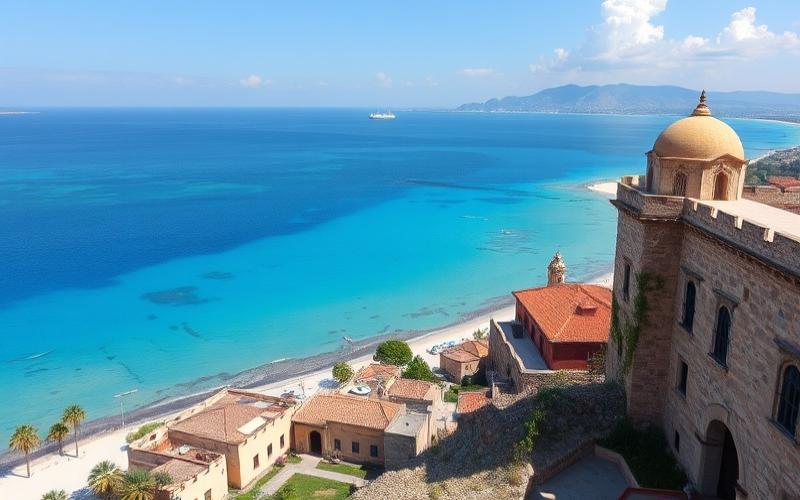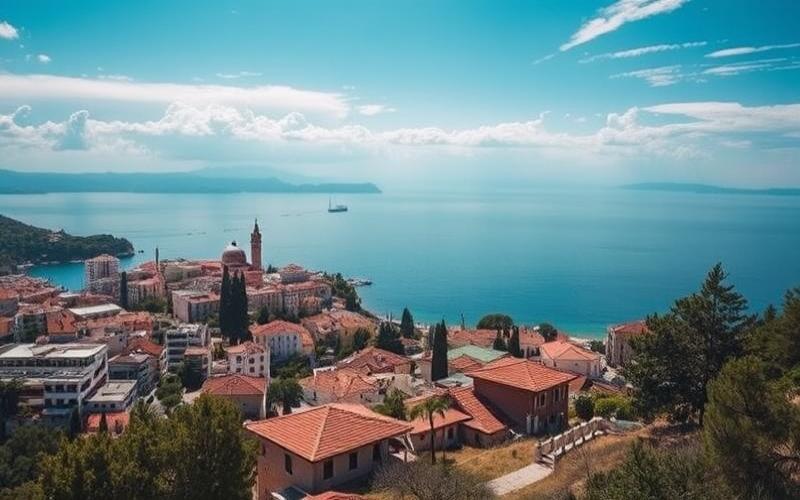
 Published on and written by Cyril Jarnias
Published on and written by Cyril Jarnias
Navigating regulations and procedures to obtain a construction permit in Turkey can be quite challenging, especially for those unfamiliar with the Turkish administrative system. This article delves into the world of legal requirements and guides you step by step to overcome potential obstacles and maximize your chances of success.
Between strict local laws, required documents, and administrative timelines, we break down essential information for you while highlighting the latest reforms and changes that could impact your project.
Understanding Urban Planning Regulations in Turkey
Main Laws Governing Urban Planning in Turkey:
- Urban Development and Construction Law (Imar Kanunu, No. 3194): general framework for urban planning, construction permits, zoning regulations, and land use.
- Disaster Management and Earthquake-Resistant Construction Law: strengthens construction standards for seismic safety.
- Environmental Protection Law: imposes environmental criteria for new projects.
- Cadastre and Land Registry Code: ensures accurate land boundaries and legal property registration.
- Recent Reforms (2024-2025):
- New requirements for integrating renewable energy (solar, wind, cogeneration) into construction permits.
- Mandatory inclusion of electric vehicle charging infrastructure in residential projects.
- Limitation and measurement of building carbon footprint throughout their lifecycle.
- Full digitalization of construction data and implementation of 3D models to speed up administrative procedures.
Administrative Procedure for Obtaining a Construction Permit:
- Application submission to the local municipality or competent authority (online for certain steps).
- Required documents:
- Property title.
- Site plan and approved architectural drawings.
- Environmental compliance study.
- Proof of tax and fee payments.
- Certificate of compliance with seismic and energy standards.
- File review by technical and urban planning services.
- Zoning compliance verification (land use, maximum heights, density, setbacks, etc.).
- Possible consultation with other services (environment, public works, heritage).
- Issuance of the construction permit if all conditions are met.
- On-site inspection before and after construction for occupancy certificate issuance.
Table: Zoning Restrictions and Environmental Criteria
| Criterion | Requirement/Restriction |
|---|---|
| Land Use | Residential, commercial, industrial, mixed-use, agricultural |
| Maximum Height | Varies by urban area, typically between 4 and 10 stories |
| Setback | Minimum distance from street/neighbors |
| Density | Maximum number of housing units/m² |
| Green Spaces | Mandatory percentage in projects > 2,500 m² |
| Accessibility | Inclusive play areas for children with disabilities |
| Renewable Energy | Mandatory integrated systems for certain buildings |
| Carbon Footprint | Mandatory measurement and capping |
Roles of Local and National Authorities:
- Municipalities: process permit applications, verify compliance with local urban plans, conduct inspections.
- Ministry of Environment, Urbanization, and Climate Change: develop national policies, oversee major projects, manage digital databases.
- Cadastre Directorate: land registration, issuance of cadastral maps.
- Specialized agencies (environment, energy): environmental impact assessment, technical opinions.
Typical Timelines and Document Compliance:
- Average time to obtain a construction permit: 2 to 4 months, depending on project complexity and file completeness.
- Documents to provide (non-exhaustive list):
- Architectural and technical plans.
- Environmental compliance certificate.
- Property title.
- Proof of tax payments.
- Certificates related to seismic and energy safety.
- Additional delays possible in case of environmental consultation or projects in protected areas.
Important Note:
Since 2025, all procedures and data are gradually being digitalized, speeding up processes and enhancing transparency for users and authorities.
Good to Know:
Turkey primarily governs its urban planning through the Urban Development and Construction Law, which sets construction standards and zoning regulations. Recent reforms, such as stricter environmental criteria, aim to promote sustainable development. To obtain a construction permit, you must submit an application including architectural plans and environmental impact studies to local authorities. Zoning restrictions vary by municipality, particularly regarding building height and density. Typical approval timelines can range from a few weeks to several months. Local authorities, sometimes in collaboration with national agencies, play a crucial role in verifying project compliance with current laws. It is essential to thoroughly research specific required documents and procedures unique to each region, as they can significantly influence your project timeline.
Required Permissions for a Construction Permit
Documents Required to Obtain a Construction Permit in Turkey:
- Cadastral map of the land
- Detailed architectural project, compliant with Turkish and local standards
- Zoning certificate (imar durumu belgesi), issued per Article 18 of Zoning Law No. 3194
- Property title (tapu) of the site
- Static (structural) plans
- Environmental Impact Report (EIA), if required based on project nature
- Infrastructure plans (water, electricity, sanitation)
- Compliance declarations with safety rules (often notarized)
- Public utility connection requests (water, gas, electricity)
- Other specific documents may be required depending on location or project nature
| Document | Issued by / Main Function |
|---|---|
| Cadastral Map | Cadastre Office – location and boundaries |
| Architectural Project | Licensed Architect – technical and legal compliance |
| Zoning Certificate | Municipality – compliance with local zoning |
| Property Title (tapu) | Cadastre Office – proof of ownership |
| Static Plans | Structural Engineer – building safety |
| EIA Report | Ministry of Environment (if required) |
| Compliance Declarations | Notary/Engineer – adherence to standards |
Role of Local and Regional Administrations
- Municipal Urban Planning Service: Receives and processes applications, verifies project compliance with local regulations, issues permit if all conditions are met.
- Municipality: Develops urban plans, defines zoning rules, monitors standard enforcement.
- Prefecture (Governorate): Intervenes if the municipality lacks necessary authority or for areas outside municipal boundaries.
- Ministry of Environment and Urbanization: Oversees, especially for large projects or those in sensitive areas.
Specific Conditions for Protected Areas or Listed Buildings
In protected areas (archaeological sites, natural areas, coasts, etc.), obtaining additional permits is mandatory, sometimes from the Cultural Heritage Protection Board or the relevant ministry.
For listed or historic buildings, any intervention requires prior approval from heritage protection authorities; work is strictly regulated and subject to special procedures, often longer and more complex.
Typical Timelines for Obtaining a Construction Permit
Average time: 1 to 3 months for a complete and compliant file in urban municipalities.
The timeline may be extended in case of requests for additional information, protected areas, or complex projects.
Appeals in Case of Denial
Possibility to request a review of the decision from the municipality (administrative appeal).
Administrative appeal to the competent administrative court if the denial is upheld.
The applicant must justify project compliance and may seek assistance from a specialized lawyer to defend their case.
⧉ A construction permit obtained without following these steps or for a non-compliant project may lead to work stoppage, administrative penalties, and the obligation to demolish illegal constructions.
Good to Know:
To obtain a construction permit in Turkey, it is imperative to submit a file containing the cadastral map, an architectural project compliant with local standards, and the zoning certificate. The municipal urban planning service, in collaboration with regional administrations, plays a key role in reviewing and approving applications. In protected areas or for listed buildings, specific conditions may apply, often requiring input from heritage experts. The typical time to obtain a permit ranges from a few weeks to several months, depending on project complexity and administrative workload. In case of denial, it is possible to appeal to the competent authorities, a process that often requires assistance from a lawyer specialized in urban planning law to maximize chances of success.
Practical Guide for Expatriates and Builders
Essential Steps to Obtain a Construction Permit in Turkey
1. Understand Applicable Legislation and Regulations
The main laws governing construction are:
- Zoning Law No. 3194
- Construction Law No. 4708
- Environmental Law No. 2872
2. Preparation of Required Documents
- Detailed architectural plans (compliant with Article 22 of Law No. 3194)
- Static and technical project plans
- Property title or land purchase contract
- Proof of construction insurance
- Copy of passport or ID
- Valid residence permit (for expatriates)
- Turkish tax certificate if required
3. Official Submission to the Competent Municipality
The entire file must be submitted to the local town hall, which verifies:
- Compliance with local urban plans and urban development plan
- Adherence to environmental standards
4. Administrative Review and Preliminary Inspections
- Technical verification by municipal services
- Possibility of additional inspections depending on project type or location
5. Official Permit Acquisition: Legal Start of Construction
Comparison: Natives vs. Expatriates – Differences in Procedures
| Procedure / Condition | Turkish Native | Expatriate / Non-Resident |
|---|---|---|
| Land Ownership | Unrestricted | Certain restrictions for foreigners in strategic zones |
| Required Personal Documents | National ID | Passport + residence permit |
| Right to Acquire Property | Yes | Yes, except for local exceptions* |
| Residence Permit Required* | No | Yes, for extended stays |
* Some geographical sectors remain inaccessible to foreigners (military zones, border areas).
Approximate Processing Time for Applications
- Complete compliant submission: approximately 30 to 60 business days for an administrative response.
- Possible delays in case of:
- Incomplete documentation,
- Need for additional environmental studies,
- Or during summer/holiday periods.
Practical Tips to Facilitate the Turkish Bureaucratic Process
- Ensure all plans are signed by a locally licensed architect.
- Prepare all certified translations if documents are in a foreign language.
- Prioritize proactive communication with the municipal urban planning service.
- Research the specific legal status of targeted land thoroughly before any financial commitment.
Recommended Engagement of Local Professional Services
Key Advantages:
- Turkish architects are fully familiar with specific local requirements and optimize your chances of quick acceptance.
- A specialized lawyer secures your land transactions, ensures overall legal compliance, and anticipates potential disputes.
- A local tax advisor helps anticipate any taxes related to the construction site.
Useful Resources & Recommended Contacts:
Indicative list:
- Karanfiloglu Law Firm – Specialized legal support for foreign constructions
- National Chamber of Turkish Architects (Mimarlar Odası)
- National Chamber of Civil Engineers (İnşaat Mühendisleri Odası)
For institutional assistance:
Contact the urban planning service (“İmar Müdürlüğü”) or local “Tapu ve Kadastro Müdürlüğü” (cadastre office) directly.
Key Tip: Support your project from the start with a local multidisciplinary team; this streamlines each administrative step and significantly reduces unexpected risks & delays.
Good to Know:
To obtain a construction permit in Turkey, expatriates and builders must follow several key steps, starting with acquiring a property title, as this differs from procedures for natives who may already own property. Current laws, such as the Zoning Law, require submission of essential documents like detailed construction plans, municipal zoning plans, and an environmental impact report. Processing applications can take two to three months, so it is advisable to allow sufficient time and patience for complex bureaucratic procedures. Engaging Turkish architects and regulatory advisors, who are experts in the field, is recommended to overcome language and technical barriers. Resources such as the Ministry of Environment and Urbanization website or local municipal offices also offer valuable advice and contacts for necessary assistance.
Disclaimer: The information provided on this website is for informational purposes only and does not constitute financial, legal, or professional advice. We encourage you to consult qualified experts before making any investment, real estate, or expatriation decisions. Although we strive to maintain up-to-date and accurate information, we do not guarantee the completeness, accuracy, or timeliness of the proposed content. As investment and expatriation involve risks, we disclaim any liability for potential losses or damages arising from the use of this site. Your use of this site confirms your acceptance of these terms and your understanding of the associated risks.

























































